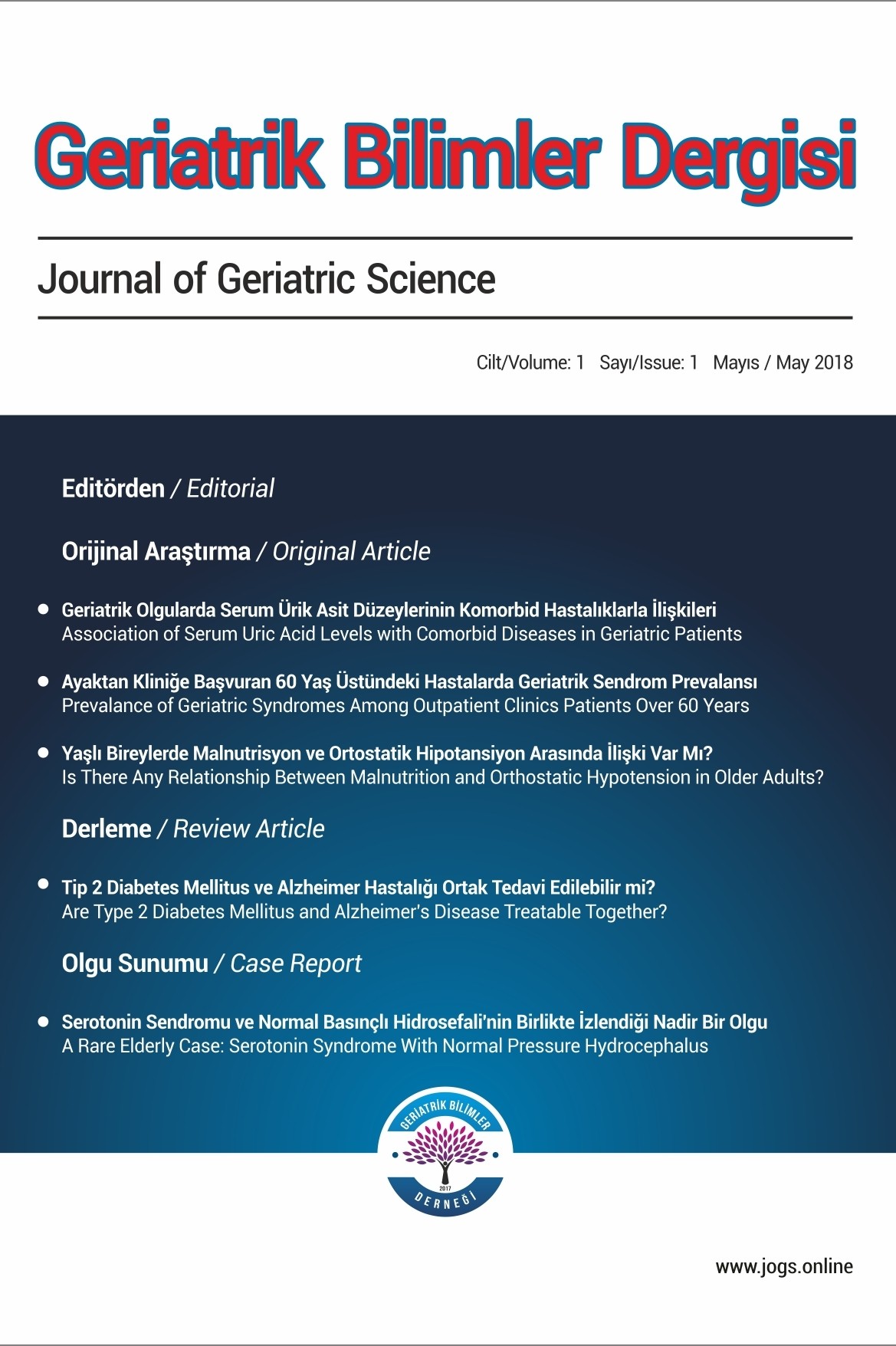Yaşlılarda Depresyon Düşme Sıklığı ile İlişkilendirilebilir mi?
Düşme, geriatrik depresyon, geriatrik sendrom, yaşlı
May Depression Be Associated with the Frequency of Falls in the Elderly?
falls, geriatric depression, geriatric syndrome, elderly,
___
- 1. Ates Bulut E, Soysal P, Isik AT. Frequency and coincidence of geriatric syndromes according to age groups: Single-center experience in Turkey between 2013 and 2017, Clin. Interv. Aging. 2018; 13; 1899-1905.
- 2. Potter G G, McQuoid D R, Whitson H E, et al. Physical frailty in late-life depression is associated with deficits in speed-dependent executive functions, Int. J. Geriatr. Psychiatry. 2016; 31(5); 466–474.
- 3. Aydin A E, Soysal P, Isik A T. Which is the preferable for diagnosis of orthostatic hypotension diagnosis in older adults, Clin. Interv. Aging. 2017; 12; 207–212.
- 4. Durmaz B. Validity and Reliability of Geriatric Depression Scale - 15 (Short Form) in Turkish older adults, North. Clin. Istanbul. 2017; 5(3); 216–220.
- 5. Moreland B, Kakara R, Henry A, et al. Trends in Nonfatal Falls and Fall-Related Injuries Among Adults Aged ≥65 Years - United States, 2012-2018, MMWR Morb. Mortal. Wkly. Rep. 2020; 69(27), 875–881.
- 6. Volkert J, Schulz H, Härter M, et al. The prevalence of mental disorders in older people in Western countries - a meta-analysis, Ageing Res. Rev. 2013; 12(1); 339–353.
- 7. Van Agtmaal M J M, Houben A J H M, Pouwer F, et al. Association of microvascular dysfunction with late-life depression: A systematic review and meta-analysis, JAMA Psychiatry. 2017; 74(7); 729–739.
- 8. Smith A de A, Silva A O, Rodrigues R A P, et al. Assessment of risk of falls in elderly living at homeo, Rev. Lat. Am. Enfermagem, 2017; 25.
- 9. T. Kvelde et al. Depressive symptoms increase fall risk in older people, independent of antidepressant use, and reduced executive and physical functioning, Arch. Gerontol. Geriatr. 2015; 60(1); 190–195.
- 10. Barry L C, Allore H G, Guo Z, et al. Higher burden of depression among older women: the effect of onset, persistence, and mortality over time, Arch. Gen. Psychiatry. 2008; 65(2); 172–178.
- 11. N. Ulusoylar. Geriatrik Sendromlarda Düşme Sıklığı, Geriatrik Bilimler Dergisi / Journal of Geriatric Science 2019; 2 (1): 8-13
- 12. Hars M, Audet MC, Herrmann F, et al. Functional Performances on Admission Predict In-Hospital Falls, Injurious Falls, and Fractures in Older Patients: A Prospective Study, J. Bone Miner. Res. 2018; 33(5); 852–859.
- 13. Magnuszewski L, Swietek M, Kasiukiewicz A, et al. Health, functional and nutritional determinants of falls experienced in the previous year—a cross-sectional study in a geriatric ward, Int. J. Environ. Res. Public Health. 2020; 17(13); 1–13.
- 14. Isik A T and Soysal P. Dementia-Related Results of ‘Costs of Medication in Older Patients: Before and After Comprehensive Geriatric Assessment, Am. J. Alzheimers. Dis. Other Demen. 2018; 33(8); 497–499.
- 15. Dokuzlar O et al. Factors that Increase Risk of Falling in Older Men according to Four Different Clinical Methods, Exp. Aging Res. 2020; 46(1); 83–92.
- 16. Bulut E A, Soysal P, Aydin A E, et al. Vitamin B12 deficiency might be related to sarcopenia in older adults, Exp. Gerontol. 2017; 95; 136–140.
- Yayın Aralığı: Yılda 3 Sayı
- Başlangıç: 2018
- Yayıncı: Geriatrik Bilimler Derneği
COVID-19 Pandemisine Yönelik Gerontolojik Müdahale Önerileri
Sosyal Belediyecilik Bağlamında Yaşlı Bakım ve Alzheimer Gündüz Yaşam Merkezleri
Muhammed ŞENER, Hasan Hüseyin TEKİN
Yaşlılık İnancı ve Yaşlılık İnancını Etkileyen Etmenlerin İncelenmesi
Şenay ÖZTÜRK, Yalçin KANBAY, Meryem FIRAT, Aysun AKÇAM, Burcu DEMİR
İshak ŞAN, Günseli UZUNHASANOĞLU, Birgül ÖZKAN
Yaşlılarda Depresyon Düşme Sıklığı ile İlişkilendirilebilir mi?
Feyza MUTLAY, Neziha ULUSOYLAR ERKEN, Fatma Sena DOST GÜNAY, Derya KAYA, Ahmet Turan IŞIK
Geriatrik Erkeklerde Nokturi ve Ayrıntılı Geriatrik Değerlendirme Parametreleri
Pinar SOYSAL, Lee SMITH, Ekrem DUTOGLU, Igor GRABOVAC, Nicola VERONESE, Ahmet Turan IŞIK
Hipomagnezeminin Geriatrik Sendromlar ve Mortalite ile Birlikteliği
Sağlık Çalışanlarının Yaşlı İstismarı Konusundaki Algısı ve Farkındalığının Araştırılması
Yaşlı COVID-19 Hastalarında Tedavinin Güçlükleri ve Potansiyel İlaç Etkileşimleri
